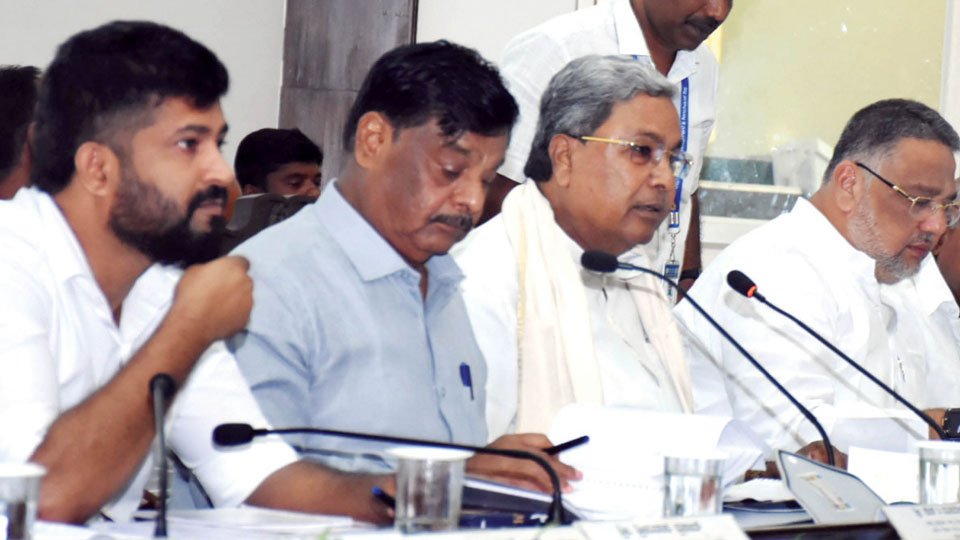‘What was the rationale of releasing water to Tamil Nadu farmers depriving our own’
Mysore/Mysuru: The focus of the KDP (Karnataka Development Programmes) meeting chaired by Chief Minister Siddharamaiah this morning was on agriculture, farmer suicides, water release from the Krishna Raja Sagar (KRS) Dam, crop loss compensation and the challenges faced by farmers due to inadequate rainfall.
The meeting took place at the Zilla Panchayat Hall and marked the first KDP meeting in Mysuru chaired by Siddharamaiah since becoming the CM.
After reviewing the progress of the Agriculture Department, the CM turned his attention to the Water Resources Department. He directed questions to Chief Engineer Venkatesh regarding the low water storage in the KRS Dam. Venkatesh informed the CM that water had been released from KRS, Kabini, and Harangi Reservoirs in accordance with instructions from higher officials and in ‘On and Off’ method.
Expressing dissatisfaction with the casual response, Siddharamaiah queried why water had been released to Tamil Nadu instead of prioritising Karnataka’s farmers, especially given the low storage level. He questioned the rationale behind providing water to Tamil Nadu farmers while neglecting the needs of their own State’s farmers.
“Why did we allocate water to Tamil Nadu farmers, depriving our own? Despite having ample water in the Mettur Dam, why did we release water from our dams? Our foremost concern should be safeguarding our crops and farmers. Why wasn’t water released in necessary quantity for our farmers?” the CM inquired, prompting the officer to search for answers.
CM presses for answers
The Water Resources Department’s Chief Engineer attempted to justify the water release based on Government and Court directives. However, an agitated CM continued to press for answers, directing a series of questions.
“In Tamil Nadu, they have expanded cultivation from 1.85 lakh acres to 3 lakh acres, utilising 63 tmcft of water from the Mettur Dam. In contrast, KRS had 113 feet of water, which has now dwindled to 102 feet. How did we arrive at this situation? Why was water not released in the required volume and rationally?” Siddharamaiah questioned.
Venkatesh clarified that the decision to release water from KRS and Kabini had been made by the Water Resources Advisory Committee. The CM urged the Department to prioritise the interests of Karnataka farmers over those of Tamil Nadu, emphasising that the ‘on and off’ release system should be implemented only during distress situations, not during the filling process of reservoirs.
Erratic rainfall patterns
During the meeting, the performance of the Agriculture Department underwent scrutiny, with the CM personally assessing progress in agricultural sector. Effective dissemination of information and support provided by the department to farmers emerged as a key discussion point.
Chandrashekhar, Joint Director, Agriculture Department, highlighted the erratic rainfall patterns experienced in the region. He noted that annual rainfall from January to December had fallen 18 percent below the average. Additionally, there was a shortfall in planting targets in Mysuru district, with only 2.33 lakh acres sown against a 3.98 lakh-acre target.
The CM raised concerns about officials’ engagement with farmers, urging a comprehensive strategy for informing farmers about alternative crops and addressing crop diseases. He stressed that the responsibility for preventing crop diseases rested with the Agriculture Department and demanded clarity on the steps taken by officials.
Warning for inaccurate info
Siddharamaiah also cautioned against providing inaccurate information, underlining transparent communication to inform Government decisions. Amid discussions, the CM pointed out a discrepancy in a slideshow presentation, eliciting laughter from the audience.
The tone grew serious when the CM addressed farmer suicides. He implored officials to expedite compensation for affected families and stressed the importance of a swift response, underscoring respect and empathy for the farming community.
Separately, concerns were raised about the absence of Assistant Agricultural Officers in the district. The lack of appointments was identified, highlighting the urgency of personnel appointments within the agricultural sector.








Recent Comments